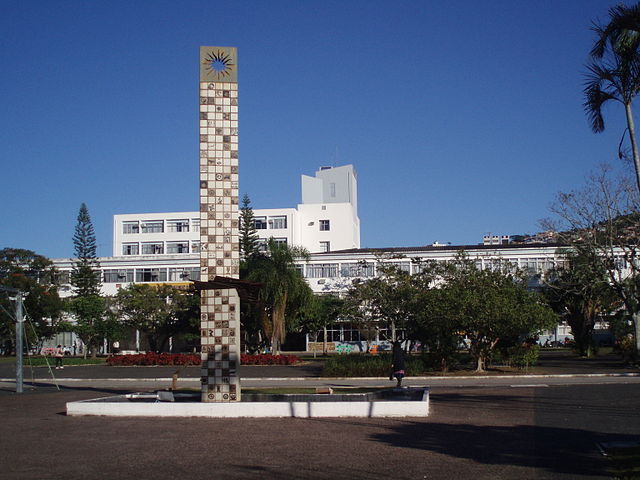Federal University of Santa Catarina
University in Florianópolis, Brazil From Wikipedia, the free encyclopedia
University in Florianópolis, Brazil From Wikipedia, the free encyclopedia
The Federal University of Santa Catarina (Portuguese: Universidade Federal de Santa Catarina, UFSC) is a public university in Florianópolis, the capital city of Santa Catarina in southern Brazil.
Universidade Federal de Santa Catarina | |
 | |
Other names | UFSC |
|---|---|
| Motto | Ars et Scientia |
Motto in English | Arts and Science |
| Type | Public |
| Established | 1960 |
| Rector | Irineu Manoel de Souza |
Administrative staff | 4,539 |
| Undergraduates | 29,595 |
| Postgraduates | 14,233 |
| Location | , , |
| Campus | Urban |
| Website | www |
Considered one of the leading universities in Brazil, UFSC is the 6th best university in Latin America in the ranking of Times Higher Education; the 23rd by QS World University Rankings, and was ranked as the 10th best institution of higher education in Latin America by the Webometrics Ranking of World Universities. In the annual ranking of the Brazilian newspaper Folha de São Paulo, it is the 6th best Brazilian university, with courses being among the ten best in the country.[1][2][3][4][5]
The structure of its campus comprises 11 Academic Schools (Centros de Ensino), divided by field of study. Every School is divided in departments, the largest one being the Department of Mechanical Engineering. The oldest school at UFSC is the School of Law. The Department of Law was the first of UFSC's departments to be officially recognized in 1932.

The history of the Federal University of Santa Catarina has its roots in the Polytechnic Institute of Florianópolis founded on March 13 of 1917 by José Arthur Boiteux. Organized as a free institute, it was the first college degree institution of Santa Catarina state. On February 11, 1932 the Law School was incorporated, officially in 1935.

That triggered a movement to start the first state university and on December 18, of 1960 it became the University of Santa Catarina, offering the courses of Law, Medicine, Pharmacy, Philosophy, Economics, Social Service and the School of Industrial Engineering. On July 15, 1968, as an effort of the Brazilian government to improve college education in Brazil with education reform, the major universities in Brazil were reorganized in Schools and Departments and acquired a new education structure, more resembling the American and English methodology. Since then the university became the Federal University of Santa Catarina.
In 1961 the institution earned a new place in the city to build its structure, located in the region of Trindade near downtown Florianópolis. The area was previously occupied by a model farm called Assis-Brasil and is located near the coast, having several streams crossing the actual campus. The moving was finished in 1980.
A young university, the Federal University of Santa Catarina continues to grow. During the 1980s, it began to invest heavily in the expansion of graduate programs and research, besides supporting the creation of technology centers in the state of Santa Catarina and the development of a number of outreach projects for the community. Today, UFSC has four other campuses distributed in the cities of Araranguá, Blumenau, Curitibanos and Joinville.[6]
The Universidade Federal de Santa Catarina undergraduate admission process is almost similar to all others in Brazil, using a process called vestibular. It is comprised by several written tests usually performed in 2–3 days. The competition is fierce and the percentage of successful applicants is usually lower than 15% (12,6% in 2018's process[7]).
The admission process for graduate school is more complex and usually involves a test and a recommendation from the previous college. People interested in graduate degrees at UFSC should contact the department of the intended program directly. The Brazilian Ministry of Education, through CAPES (Coordenação de Aperfeiçoamento de Pessoal do Nível Superior, Superior Level Personnel Enhancement Coordination) evaluates graduate programs in Brazil every three years, ranking them from 1 (worst) to 7, being 6 excellence and 7 international excellence level.
The following graduate programs at UFSC have received grades 6 or 7, as per the last CAPES evaluation (2013):[8]

2016 numbers, provided by the institution.

Seamless Wikipedia browsing. On steroids.
Every time you click a link to Wikipedia, Wiktionary or Wikiquote in your browser's search results, it will show the modern Wikiwand interface.
Wikiwand extension is a five stars, simple, with minimum permission required to keep your browsing private, safe and transparent.